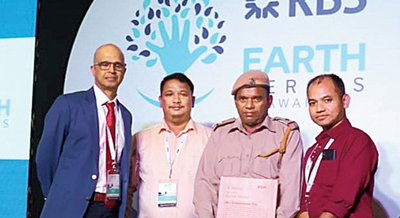
Corporate Citizen Claps for forest guard Dimbeshwar Das who received the rbs (the royal bank of scotland) honour for safeguarding endangered species, especially the white horn rhinos for the past three decades in and around the kaziranga national park reserves

Attached to the Assam Forest Department, the 53-year old Dimbeshwar or ‘Dimba’ as he is fondly known, was awarded by RBS as ‘Earth Hero, Green Warrior’, for rendering his undying services to help conserve an almost extinct species the Great Indian one-horned rhinoceros. He was nominated by his controlling officer, the ex-divisional forest officer, Rohini Ballave Saikia and becomes the only Assamese to have been selected and won the prestigious 9th RBS Earth Heroes Award ceremony under the Green Warrior category. The award recognises Dimba’s unrelenting and ‘silent’ efforts in the past 30 years in conserving the one-horned rhino, despite several adversities in an area that stands as one of the last havens for these creatures. He is also referred to as ‘The Wall’ (between the poachers and the rhinos) amongst his colleagues and locals. RBS’s wildlife conservation award carries a citation and a cash award of Rs.2 lakh. Dimba has worked up the ranks from a 23-year old boatman when he joined the Kaziranga National Park services in 1987, gradually getting promoted as forest guard with exceptional skills in thwarting dangerous poachers and hunters. Dimba said, “I have been deputed to the interiors of the Park densely forested and out of bounds for tourists. But it was only when the poachers threatened me, that I felt that my and my family’s life was in danger.” He has also been at the receiving end of threats since 2013 and has survived bullets and had to change houses to evade life threats to his family members too. “Trust me, no one works as hard as the Kaziranga guards. If we didn’t work, the rhinos wouldn’t be alive. You need to be alert 24/7, during the annual floods, ever more so.” A salutation to this ‘wildlife’ sentry is definitely warranted!
Corporate Citizen slaps the ailing quality of public education and vocational training being imparted in the Country

Despite the central government’s mandatory call for skill-based education as part of school and college curriculum, a recent UNICEF report berates the quality of this very education. Despite a hike in the numbers of qualified candidates being churned out every year, a recent UNICEF report titled BC-Education 2030 Skills Scorecard predicts that, “India will have the highest number of secondary school graduates among South Asian nations at over 30 crores by 2030 but, nearly half of them will lack skills to enter the workforce.” This means that only about 47% of Indian school graduates by 2030 will have the requisite skills to be employable in comparison to Bangladesh at 55% and 40% for Pakistan. At 30.96 crore, India is expected to contribute the most. However, Bhutan is predicted to have the highest proportion of skilled graduates at 81%, Nepal and Maldives at 46% of secondary school graduates with basic skills in 2030, whereas Sri Lanka stands at 68%.
Another UNICEF report indicated that the low quality of education and sub-optimal vocational training deters students to the desired skill levels demanded by the labour market, in addressing the youth skills gap. Henrietta Fore, UNICEF Executive Director said, “South Asia is at a critical juncture, with a limited window during which it can reap significant demographic dividends from its talented and capable youth. Get it right, and millions could be lifted out of poverty. Fail to do so, and economic growth will falter, youth despair will rise, and further talent will be lost to other regions.” The UNICEF led ‘Voices of Youth’ survey amongst South Asian youths in the under-24 age group revealed that they are battling outdated education systems. Also, lack of work experience, inadequate support services, bribery demands, discriminatory and unfair hiring practices add to the em-ployability barriers, even after graduation. While a significant revamp in the school education system is looking at giving credits for skill education after Grade 10, the future of our youth needs skill-based intervention to match global trends Now or Never!